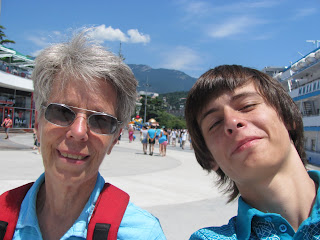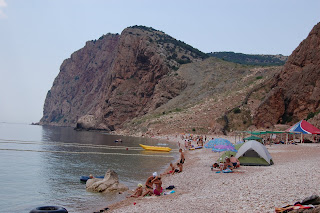

Wine cellar in a cave in the Reserve.


Serdar and I in Yalta.

The Massandra Winery.

Serdar with the Pickle Project ladies, Sarah and Linda.

At the library—my last few days before taking off on my trip to the US. It’s slow here, as it always is in the summer when many people have their month vacation, so I am just trying to get caught up on a few things—like blog posts—before I take off. And struggling a bit with the library about how they can receive the money from the $15,000 grant we were awarded to purchase a rare book scanner. Seems the library is not set up to receive foreign funds, so they will have to set up a separate account and then do a lot of reporting to the Ukrainian government. The accountant for the library is clearly not interested in doing all of this, but I don’t think there is any choice. They wanted me to get the money and then give it to them, but I told them that was not possible. Ah well, like everything here, it will eventually get resolved if one can just stay patient enough.
Have done some adventuring around Crimea since my last post. Cheryl and I did indeed make it to Novy Svit down on the coast a couple of weekends ago. We were to meet at the bus station in Sudak, a two-hour bus ride for me, but as it turned out, a much longer ride for Cheryl due to her pokey bus stopping at every little village. So I spent an hour or so hanging out waiting for her, but having a good time, talking with the women there who meet the buses with apartment rental signs, something you see everywhere on the coast in the summer. Residents of the coastal towns can rent out their apartments to tourists for pretty good rates—we paid $140 a night for a two-bedroom apartment in Yalta last summer—and it is a good source of income for the local people. So good that it is pretty impossible to have Peace Corps Volunteers in the coastal towns, as they tend to get kicked out of their apartments in the summer.
Cheryl eventually showed up, and we took a packed-with-people little bus over the winding coastal road to the little village of Novy Svit--which in the summer is transformed into a beach packed resort--but beautiful, nonetheless. I had heard about a hiking trail through the botanical reserve at the end of the beach and that was our goal. It turned out to be a gorgeous hike along the rocky headlands bordering three lovely blue bays, with deep caves tucked back into the cliff sides. During the Russian Empire time, it was the playground of a wealthy Russian prince, and the remains of his wine storage area are still there. We picnicked in the shade of a large boulder and made our way back through the forest to the town of Novy Svit. I had brought my new swimsuit—a little less bikini than the old one which ended up with a young PCV—and really wanted to go in the water. Cheryl was not too interested, and given that once again, the water was ice cold, she probably made the better choice. A great day it was in yet another amazingly beautiful area of Crimea.
Late Wednesday night, the Pickle Project Ladies—Sarah Crow and Linda Norris—showed up for a 5-day visit in Crimea. They are in the middle of a planning trip for a fall project that will center on understanding culture through conversations about food. Check out their blog—pickleproject.blogspot.com—for lots of interesting information—and pictures—about what they are doing.
I took Thursday off so I could travel around with them and listen in on their food conversations. We took to calling them the “food journalists,” as it was the easiest way to say who they are in Russian. One of the things they wanted to do was go to a winery in Crimea, especially the famous 200-year-old Massandra Winery in the mountains above Yalta. Serdar gladly came along as our interpreter, and off we went on the bus to Yalta. Our excursion started with a walk along the boardwalk in Yalta (Linda had never been there), a pretty bad—but cheap—lunch in an old Soviet style cafeteria on the waterfront, and then an hour tour through the winery in a village close to Yalta. We didn’t actually taste the wine, as it added to the cost of an already high priced tour and none of us were that interested in drinking the wine, more in how it has historically been produced in the deep underground cellars built into the mountainsides. We made our way back to Simferopol on the slowest bus possible, finally getting off short of our destination in Simferopol and walking along the river to a Crimean Tatar restaurant I knew about for a nice dinner of traditional dishes. A great day with the very much added bonus of having the company of Serdar all day.
We spent most of Friday touring the markets and talking with Cheryl and Brian, the returned PCV who is doing an oral history project at the library. Saturday we went to the book market in town and then to the central market for food for our cooking extravaganza with Lenura later that day. Lenura taught Sarah how to make the Crimean Tatar dish manti, including how to roll out the dough, which I find a pretty daunting task. But Sarah got into it and ended up with some fine manti. Linda videotaped the whole process and later interviews with Neshet about his childhood food memories. We had a great meal of manti and two different kinds of salads, wine, and lots of laughter. And me interpreting much of the time! I actually did pretty good—they kept telling me that I sell myself short about my language skills, that I can speak Russian better than I think I can. That was pretty encouraging to hear.
On Sunday—a very hot day—I wanted to go to Bakcherseray to buy presents at the Crimean Tatar crafts cooperative for my friends in America. We combined it with a hike up to the cave city of Chufat Kale. I have been there many times, so I let them make their way up to the plateau and went on past the cave city to an ancient Karim Jewish cemetery I had heard about. And I was so glad I did—it was a deeply peaceful—and cool--place full of tall trees and old moss covered gravestones etched in Hebrew. I only encountered one person there, a young woman who was sitting in the midst of the tombs, quietly concentrating on a drawing she was working on. Standing in the center of the grave covered ravine, you could feel the history there, the centuries of people who have come and gone, the fragileness of existence. I could have spent a long time just sitting there, and maybe one day I will go back and do just that.
It is a couple of days later now. Sarah and Linda left on the train last night for their next destination, Odessa. I am going to try and do some work this week, but mostly I seem to be focusing on present buying and packing up my house for the move to the Seytaptiev’s. And I think my neighbor will be coming home today with her new baby, so that will be a fun event. As the time gets nearer for my trip to the US, I find myself getting more and more excited to see everyone, and also more and more curious about how it will feel to be there and what affect the experience will have on how I feel about staying in Crimea. Right now, Crimea feels like my home, though I expect the familiarity of places, the love of my friends, the understanding of the language will all create a strong pull on my heart and mind. Or maybe not… maybe I will miss my life here so much that I will be anxious to get back. I do know I want to stay in touch as much as I can with Nadjie and the Seytaptiev’s because I know I will miss them, and also it will give me a chance to keep speaking Russian!
Well, this is a very long post and perhaps the last until I return to Crimea. Much love to all and to at least some of you, see you SOON!




